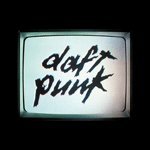
Daft Punk Human After All
(Virgin)
For almost ten years, Thomas Bangalter and Guy de Homem Christo have defined cool. From the White Island shores to the shady clubs of Paris, from Miami music conferences to the style bars of New York, the robot-men have released singles and videos that take retro-electro and dodgy poodle rock and by a miracle of French alchemy create the very avatar of avant-garde. The group's name, bestowed on the pair by a UK rock critic slating their early band, signals a deadly straight-faced approach to taste whereby everything they liked as kids - Kiss, Jean Michel Jarre, Barry Manilow - was available as the inspiration for modern funk classics. Initially they were inexplicable; Da Funk's video showed a man in a dog costume wandering the streets of NY. Later they were inspirational, as in the stunning Around the World. Always, they were wilful, individual, and leftfield.
If Homework contained brilliant moments, at the same time it was too long, padded and at times directionless. It was an album for the clubbers on the Mediterranean sands rather than for serious listening. But key elements of the model carried over: repetition of simple vocal samples almost beyond human patience, vocoders, and bad-taste-as-good-taste, naff-but-irresistible, ever-so-French, we're-never-sure-they're-quite-taking-it-seriously, retro. The result was 2001's anthem, One More Time, and a quite outstanding, almost perfect album, Discovery, whose squidgy jewel, Harder, Better, Faster, Stronger was an Olympian paean to distorted synth vocals that would have made Mozart crap himself with glee. Just for fun they also started dressing up as robots in a rather peculiar cross between Kraftwerk and Buck Rogers.
What then, has gone wrong on Human After All, the pair's latest outing? All the elements are there (I've checked back, believe me): high-camp codpiece rock synths, sub-Stevie Wonder ballads, electro-funk behemoths, up-tempo/down-tempo end-of-the-nighters. And more vocoders. Millions of vocoders. It's not even that the standout tracks are missing. Robot Rock is a monster, sure-fire rocket; Make Love is pure Copacabana; there's even an innovation, the hard-as-steel The Brainwasher that marks a slightly tougher edge present on the whole album. And it's a sensible length for an album. Why then has this left me as cold as Discovery left me ecstatic?
The answer is not so much that music has moved on. In some ways DP have always been trying to create a model for timeless-retro, modern classics that function as palimpsest, erasing their own inspiration and existing in some way outside of musical history. But that's not the case here. Chemical Brothers, Basement Jaxx, even (ugh) Prodigy have struggled recently against the younger, keener, cooler kids coming through. Daft Punk's futuristic retro now sounds passé, as if closeted in the studio or cosseted in the VIP areas, Thomas and Guy have lost sight of what's making people go crazy right now. Human After All doesn't sound so much retro as dated, not a cutting-edge post-ironic take on 70s stadium and synth music, but something recorded in 2001. Or worse, 1996. Inexplicably, predictably, Daft Punk have become the first band to produce a retro post-parody of their own work.
16 April, 2005 - 23:00 — Ben Bollig